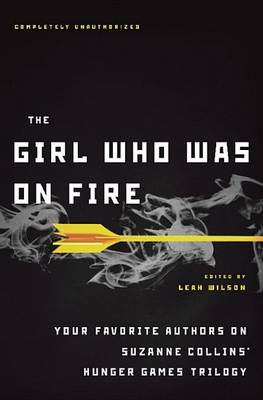Reviewed by Rinn on
This review will contain spoilers for The Hunger Games trilogy.
Last week, whilst browsing NetGalley and eagerly awaiting the arrival of The Hunger Games on DVD (finally!), I spotted this. As I am a ridiculous fangirl, I instantly jumped at the chance to read more about Katniss, Peeta, Gale et al. As the first essay of the book proclaims, I was 'hungry for The Hunger Games' (ho ho ho).
From the very beginning, the book raised many questions that I - completely sucked in by the story of The Hunger Games trilogy - never really asked myself. If I was a citizen of Panem, would I follow the coverage of the games as eagerly as rest? Would I see the barbaric show for what it really was? I would like to think I'd be disgusted by the very idea, but in all honesty I would probably just be like all the others, which is really quite shameful. I found myself questioning why it is I like the series so much - is it the story, the characters, the way it's written - or could it be, that like the citizens of Panem, I'm easily drawn in by promises of violence, unable to look away? A scary thought.
After reading this collection of essays, I now realise I didn't know Katniss that well - as one essay points out, she shocks the reader when she kills Coin rather than Snow. Some readers may have seen that coming, but I certainly didn't. In fact, Katniss barely knows herself. I'm also reminded why I love the trilogy - yes, it's a Young Adult novel, of which there are an abundance these days; yes, there's a love triangle; yes, there's a female heroine/protagonist - but it's all so different. Katniss is strong, for one, but not obviously so. She knows how to survive and overcomes so many obstacles. She may be scarred at the end, but she works slowly through it. She has no time for romance - what a breath of fresh air!
One particular stand out point in these essays was the fact that Suzanne Collins really thought about her characters names. I knew whilst reading the series myself that the Capitol was based on ancient Rome, the citizens of the Capitol had the names of prominent Romans. But what I didn't think of was the fact that Katniss is a tough, durable plant, as Katniss is a tough, durable character; whereas Prim and Rue are delicate plants, and fragile characters. The stand out articles to me were by 'Reality Hunger' by Ned Vizzini, which intertwined his own experiences of media exposure with Katniss'; and 'Not So Weird Science' by Cara Lockwood, a fascinating look at genetic science and its possibilities in the real world.
Brett Hartinger's criticism of Mockingjay - which he didn't enjoy at all - was a brave move in a book created for fans. I felt that it balanced the book out, and gave it a more professional element - it wasn't just continual praise. What is especially interesting is that when I have spoken to people about the trilogy, most of them, including myself, consider Catching Fire the weaker of the three books. It was interesting to see it from another viewpoint.
I also had a few issues with the collection. Many quotes from the trilogy were used to illustrate points, and I feel they should have included page numbers for easy reference. I would have also liked some continuity - some authors felt the need to use quotation marks, others did not - it would be best if they all had, as sometimes it wasn't entirely clear where a quotation started or ended. One contributor also constantly referred to Katniss as 'Kat', which irritated me - though that is just a personal preference and I'm sure many other readers wouldn't be bothered.
Finally, Brett Hartinger claimed that none of the events in the latter half of Mockingjay were as memorable as the ones in The Hunger Games. The very sudden, unexpected deaths of Finnick and Prim? The bombing of the hospital? The variety of pods in the streets? The lizard mutts? All of those moments are just as memorable to me as those in The Hunger Games, in some way they are more memorable because by that point I'd spent more time with those characters, so the deaths were more shocking.
I was considering giving this book a 4 star rating, but when I compare it to other 4 star books I didn't quite enjoy it as much as I enjoyed them, so I am instead giving it a very solid 3 stars. I would heartily recommend it if you're a big fan of the series. Between starting to read the book, and writing the review, my DVD of The Hunger Games finally arrived. After reading this book, I now feel I can watch it with a new perspective.
This review is also posted at my blog, Rinn Reads.
Reading updates
- Started reading
- 8 September, 2012: Finished reading
- 8 September, 2012: Reviewed

